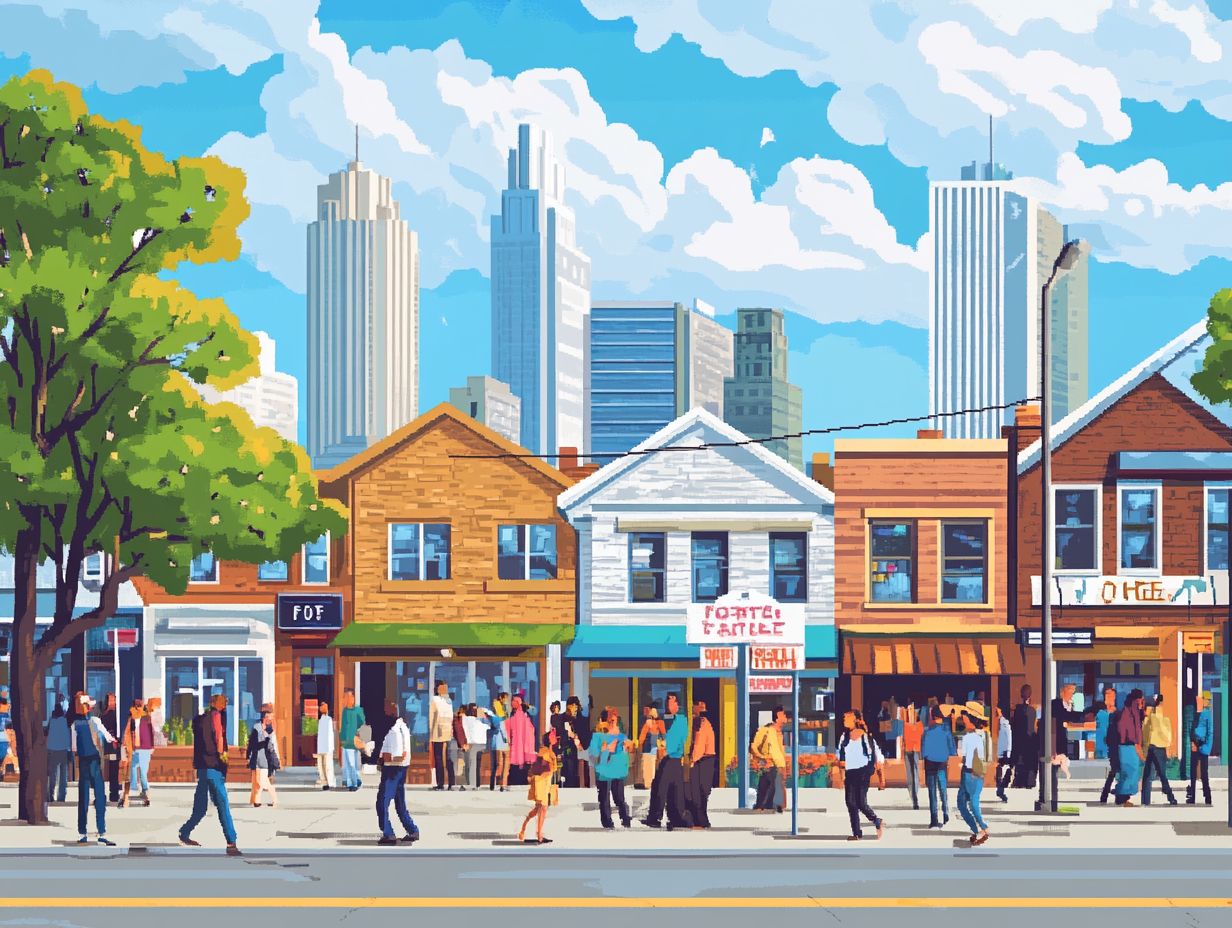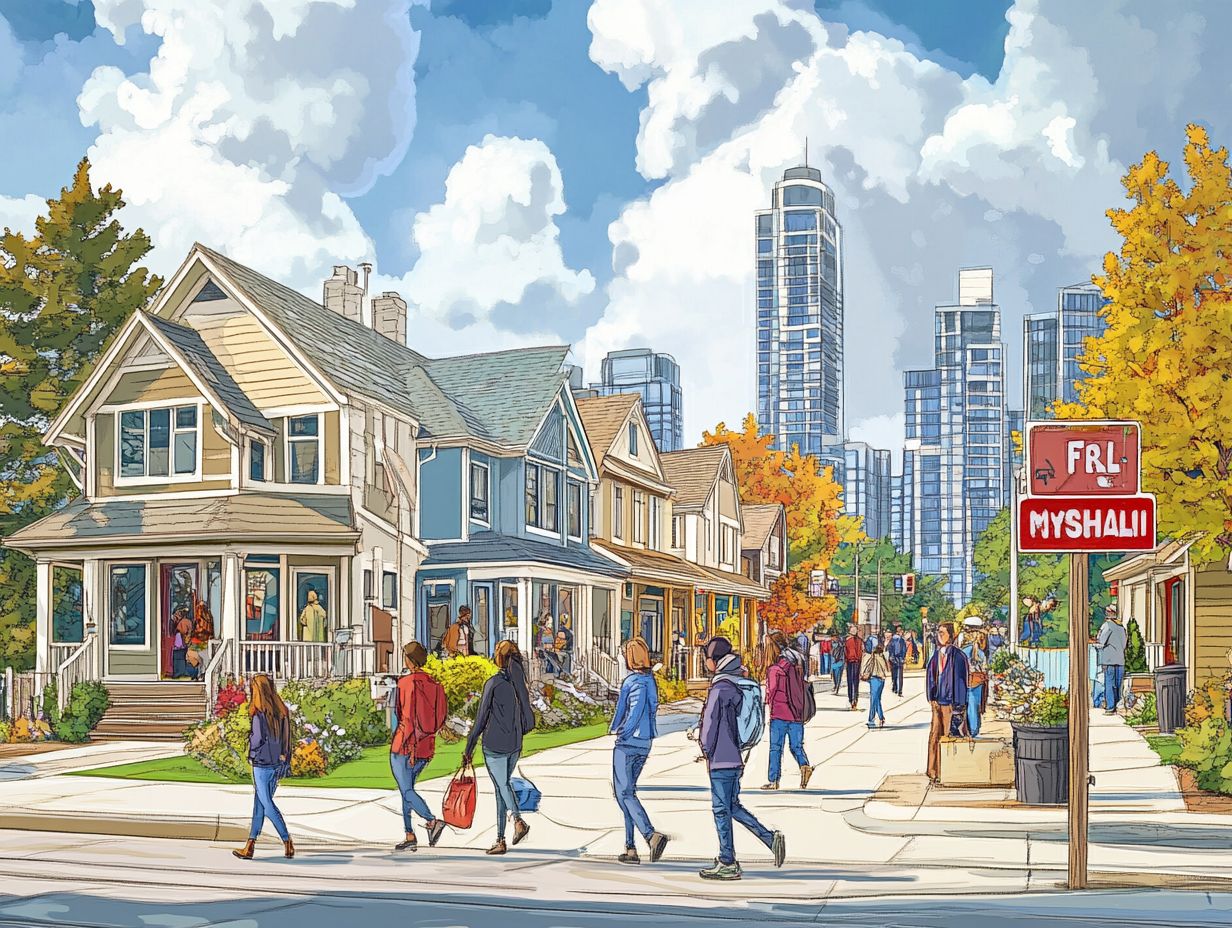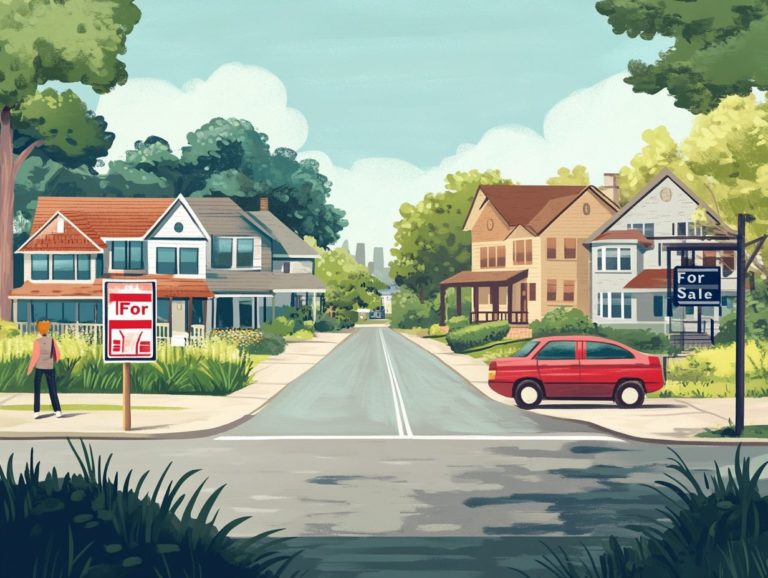The Influence of Urbanization on Home Prices
Urbanization is reshaping cities and affecting home prices in exciting yet challenging ways.
As more individuals flock to urban areas in search of opportunities, the demand for housing soars, driving up prices.
Explore how urbanization is shaping our cities and affecting home prices today! This exploration highlights the intricate relationship between urbanization and housing markets, focusing on population growth, infrastructure development, and economic trends.
It also examines government policies and the urgent need for affordable housing solutions in an increasingly competitive landscape. Join us to navigate these dynamics and find ways to keep housing accessible for everyone!
Contents
- Key Takeaways:
- Understanding Urbanization and Home Prices
- Factors That Affect Home Prices in Urban Areas
- The Role of Government Policies
- Challenges and Solutions for Affordable Housing in Urban Areas
- Preguntas Frecuentes
- Qu es la urbanizaci n y c mo influye en los precios de las viviendas?
- C mo impacta la urbanizaci n en la oferta y la demanda de viviendas?
- Existen otros factores adem s de la urbanizaci n que afectan los precios de las viviendas?
- Cu les son los posibles beneficios de la urbanizaci n en los precios de las viviendas?
- C mo afecta la urbanizaci n el costo de la vida en las ciudades?
- Hay alg n inconveniente en la influencia de la urbanizaci n sobre los precios de las viviendas?
Key Takeaways:
- Urbanization greatly affects home prices due to factors such as population growth, development, and economic trends.
- Government policies play a crucial role in shaping home prices in urban areas, with zoning regulations and affordable housing programs impacting affordability.
- Challenges in providing affordable housing in urban areas, such as rising prices and displacement, can be addressed through initiatives aimed at promoting affordable housing.

Understanding Urbanization and Home Prices
Urbanization is a transformative force reshaping the housing market worldwide, especially in major cities. This phenomenon includes demographic shifts, such as population growth, which drives up house prices and increases demand for various housing options.
As urban environments evolve, the quality of life takes center stage, creating a nuanced relationship between housing affordability and financial market stability. Organizations analyze these dynamics carefully.
Urbanization impacts the housing stock and redefines spatial relationships within urban areas, highlighting the need for sustainable communities and effective urban planning.
Defining Urbanization and Its Impact on Home Prices
Urbanization signifies the growing trend of people moving from rural areas to urban centers, significantly influencing home prices and housing demand in metropolitan regions.
As cities expand, the demand for housing intensifies, causing prices to soar, especially in sought-after neighborhoods.
The influx of people naturally attracts businesses, stimulating local economies and creating vibrant economic corridors that accelerate these demographic shifts.
Take cities like San Francisco and New York as prime examples; housing prices have surged due to the limited supply meeting an ever-increasing demand from a workforce eager to be close to job opportunities.
This interplay fosters a competitive urban landscape. Cities that manage growth, infrastructure, and housing availability effectively tend to enjoy enhanced economic vitality, making them appealing to both residents and investors.
Factors That Affect Home Prices in Urban Areas
In urban areas, several factors profoundly impact home prices. Understanding the complex dynamics of the housing market alongside prevailing economic activities is essential.
These elements shape housing demand and influence construction costs and the rental market, ultimately determining property values and housing affordability.
Population Growth and Demand
Population growth is a key catalyst for housing demand in urban areas, intensifying the need for diverse and affordable housing options.
As communities expand and more individuals migrate to metropolitan regions, the strain on existing infrastructure becomes evident.
This demographic shift amplifies the urgency for new residential developments and sparks conversations about initiatives designed to revitalize neglected neighborhoods.
Such transformations require careful planning to ensure these areas can sustainably accommodate the influx of residents. By balancing population growth pressures with innovative solutions, cities can enhance livability and respond to the diverse needs of their expanding populations, ultimately fostering inclusivity and economic resilience.
Stay informed about urban trends and how they affect you subscribe for updates!
Infrastructure and Development

Infrastructure investment plays a pivotal role in shaping urban development and can significantly influence home prices by enhancing both accessibility and quality of life.
This investment often gives rise to mixed-use developments, where residential, commercial, and recreational spaces harmoniously coexist, elevating the functionality and livability of urban environments.
When transit systems or roadways undergo upgrades, they not only stimulate economic growth but also attract new residents and businesses, resulting in vibrant urban revitalization.
Public-private partnerships are collaborations between government and private companies. These partnerships aim to combine resources for effective project implementation.
You can see notable examples in cities like Seattle and San Francisco, where collaboration between government entities and private developers has birthed thriving neighborhoods that promote sustainable living and foster community engagement.
Economic Trends and Job Opportunities
Economic trends and job opportunities have a direct impact on housing prices, as a robust job market draws in residents and boosts the demand for housing.
This surge in demand often results in rising home prices, as new employees look for suitable accommodations near their workplaces. Simultaneously, a flourishing economy typically increases disposable income, allowing a broader segment of the population to invest in property.
This enhanced purchasing power sets off a ripple effect, fostering competition among buyers and driving up market valuations.
As housing costs climb, they can influence the overall stability of financial markets, potentially leading to fluctuations in interest rates and affecting lending practices. Therefore, grasping these economic dynamics is key to thriving in today s housing market!
The Role of Government Policies
Government policies wield significant influence over the housing market, particularly through zoning regulations and land use strategies that directly affect the availability of affordable housing.
Understanding these dynamics is essential for navigating the complexities of today s real estate landscape.
Impact of Zoning and Land Use Regulations
Zoning regulations and land use policies play a pivotal role in determining housing affordability and the variety of housing types available in urban areas.
These regulations outline how land can be utilized, establishing frameworks that either encourage or obstruct the development of diverse housing options.
For example, when cities implement restrictive zoning laws that prioritize single-family homes, they may unintentionally stifle the construction of more affordable multifamily units.
This imbalance affects current residents and complicates the search for housing for newcomers navigating these urban environments.
By influencing the types of housing that can be developed, zoning regulations are key players in either worsening or alleviating the affordability crisis that many cities grapple with today.
Incentives and Programs for Affordable Housing
Incentives and programs designed to promote affordable housing are crucial for balancing the housing market and fostering sustainable communities.
These initiatives play a vital role in the fight against the growing affordability crisis that many families and individuals face today.
By fostering collaboration between public authorities and private developers, various financing mechanisms, tax credits, and zoning adjustments can be effectively leveraged.
For example, Low-Income Housing Tax Credits (LIHTC) motivate builders to construct more affordable units, improving the supply in a competitive market.
Community land trusts and housing cooperatives exemplify how partnership models can empower local actors while maintaining long-term affordability.
Ultimately, the success of these programs depends on a cohesive effort that aligns the interests of government entities, private enterprises, and the communities they serve.
Stay informed about these trends to make the best housing decisions!
Challenges and Solutions for Affordable Housing in Urban Areas

Urban areas are grappling with an affordability crisis marked by housing shortages and escalating home prices.
This situation presents significant challenges for people from different income levels and hampers community development efforts.
Rising Home Prices and Displacement of Low-Income Communities
Rising home prices often push low-income communities out of their neighborhoods. This makes housing affordability and social integration even more challenging. As areas become increasingly unaffordable, long-standing residents are often forced to move, shattering social ties and disrupting established support systems.
The consequences go beyond just changing addresses; they often rob communities of their cultural heritage and social cohesion, leaving many feeling isolated and adrift. This situation shows how urgent it is to find new and effective ways to make housing affordable.
Policymakers and stakeholders must work together to create sustainable pathways for affordable housing, cultivating inclusive environments where everyone can flourish.
Initiatives for Addressing the Affordable Housing Crisis
Various initiatives are being launched to tackle the affordable housing crisis, with a sharp focus on enhancing community development and boosting housing stock. These initiatives often feature partnerships between local governments and private developers, crafting a synergistic approach that maximizes resources and expertise.
A prime example is the Low-Income Housing Tax Credit, which serves as a catalyst for private investment in affordable housing projects. Many cities have started to implement zoning reforms that encourage higher-density construction, making it easier for developers to address the growing demand for affordable units.
By merging efforts from both sectors, these collaborative approaches not only seek to provide immediate housing solutions but also aim to foster long-term sustainability and community resilience.
Preguntas Frecuentes
Qu es la urbanizaci n y c mo influye en los precios de las viviendas?
La urbanizaci n, o el crecimiento de las ciudades, es un fen meno que afecta a todos. A medida que las ciudades se vuelven m s densamente pobladas y desarrolladas, la demanda de vivienda aumenta, lo que lleva a un incremento en los precios de las viviendas.
C mo impacta la urbanizaci n en la oferta y la demanda de viviendas?

A medida que m s personas migran a reas urbanas en busca de empleo y oportunidades, la demanda de viviendas aumenta. Sin embargo, debido a la disponibilidad limitada de terrenos en las ciudades, la oferta de viviendas puede no mantenerse al d a con la demanda, lo que resulta en precios m s altos.
Existen otros factores adem s de la urbanizaci n que afectan los precios de las viviendas?
S , hay varios otros factores que pueden influir en los precios de las viviendas, tales como:
- Estado de la econom a
- Tasas de inter s
- Disponibilidad de pr stamos hipotecarios
- Condiciones del mercado local
Sin embargo, la urbanizaci n es un factor significativo que contribuye al aumento de los precios de las viviendas en las ciudades.
Cu les son los posibles beneficios de la urbanizaci n en los precios de las viviendas?
La urbanizaci n puede llevar a un aumento en los precios de las viviendas, lo que puede beneficiar a los propietarios al aumentar el valor de su propiedad. Tambi n puede atraer m s inversiones y desarrollo en la zona, creando m s oportunidades de empleo y mejorando la calidad de vida en general.
C mo afecta la urbanizaci n el costo de la vida en las ciudades?
La urbanizaci n puede llevar a un aumento en el costo de la vida en las ciudades, ya que los precios de la vivienda aumentan junto con otros gastos como transporte, alimentos y servicios p blicos. Esto puede dificultar que las personas y familias de bajos ingresos puedan permitirse vivir en reas urbanas.
Hay alg n inconveniente en la influencia de la urbanizaci n sobre los precios de las viviendas?
La urbanizaci n puede traer crecimiento econ mico y beneficios. Sin embargo, tambi n puede llevar a la gentrificaci n, que desplaza a los residentes de larga data por el aumento de precios.
Esto crea una desigualdad social y econ mica. Afecta la diversidad y el car cter de nuestras ciudades, lo que es un desaf o que necesitamos abordar urgentemente.





